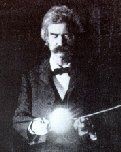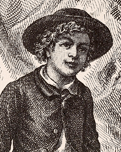
|
The following passages were quoted in at least one of the contemporary reviews of the novel. Using the links after each quotation, you can either go to the review in which the passage was quoted, or see the passage in the context of the chapter in which it originally appeared. |
| The poor unfortunate had starved to death. In one place, near at hand, a stalagmite had been slowly growing up from the ground for ages, builded by the water-drip from a stalactite overhead. The captive had broken off the stalagmite, and upon the stump had placed a stone, wherein he had scooped a shallow hollow to catch the precious drop that fell once in every three minutes with the dreary regularity of a clock-tick -- a dessertspoonful once in four and twenty hours. That drop was falling when the Pyramids were new; when Troy fell; when the foundations of Rome were laid when Christ was crucified; when the Conqueror created the British empire; when Columbus sailed; when the massacre at Lexington was "news." It is falling now; it will still be falling when all these things shall have sunk down the afternoon of history, and the twilight of tradition, and been swallowed up in the thick night of oblivion. Has everything a purpose and a mission? Did this drop fall patiently during five thousand years to be ready for this flitting human insect's need? and has it another important object to accomplish ten thousand years to come? No matter. It is many and many a year since the hapless half-breed scooped out the stone to catch the priceless drops, but to this day the tourist stares longest at that pathetic stone and that slow-dropping water when he comes to see the wonders of McDougal's cave. Injun Joe's cup stands first in the list of the cavern's marvels; even "Aladdin's Palace" cannot rival it. |
| Review |  |
MT's Text |
The minister gave out the hymn, and read
it through with a relish, in a peculiar style which was much
admired in that part of the country. His voice began on a
medium key and climbed steadily up till it reached a certain
point, where it bore with strong emphasis upon the topmost word
and then plunged down as if from a spring-board:Shall I be car-ri-ed toe the skies, on flow'ry beds of ease,He was regarded as a wonderful reader. At church "sociables" he was always called upon to read poetry; and when he was through, the ladies would lift up their hands and let them fall helplessly in their laps, and "wall" their eyes, and shake their heads, as much as to say, "Words cannot express it; it is too beautiful, too beautiful for this mortal earth." After the hymn had been sung, the Rev. Mr. Sprague turned himself into a bulletin-board, and read off "notices" of meetings and societies and things till it seemed that the list would stretch out to the crack of doom -- a queer custom which is still kept up in America, even in cities, away here in this age of abundant newspapers. Often, the less there is to justify a traditional custom, the harder it is to get rid of it. And now the minister prayed. A good, generous prayer it was, and went into details: it pleaded for the church, and the little children of the church; for the other churches of the village; for the village itself; for the county; for the State; for the State officers; for the United States; for the churches of the United States; for Congress; for the President; for the officers of the Government; for poor sailors, tossed by stormy seas; for the oppressed millions groaning under the heel of European monarchies and Oriental despotisms; for such as have the light and the good tidings, and yet have not eyes to see nor ears to hear withal; for the heathen in the far islands of the sea; and closed with a supplication that the words he was about to speak might find grace and favor, and be as seed sown in fertile ground, yielding in time a grateful harvest of good. Amen. There was a rustling of dresses, and the standing congregation sat down. The boy whose history this book relates did not enjoy the prayer, he only endured it -- if he even did that much. He was restive all through it; he kept tally of the details of the prayer, unconsciously -- for he was not listening, but he knew the ground of old, and the clergyman's regular route over it -- and when a little trifle of new matter was interlarded, his ear detected it and his whole nature resented it; he considered additions unfair, and scoundrelly. In the midst of the prayer a fly had lit on the back of the pew in front of him and tortured his spirit by calmly rubbing its hands together, embracing its head with its arms, and polishing it so vigorously that it seemed to almost part company with the body, and the slender thread of a neck was exposed to view; scraping its wings with its hind legs and smoothing them to its body as if they had been coat-tails; going through its whole toilet as tranquilly as if it knew it was perfectly safe. As indeed it was; for as sorely as Tom's hands itched to grab for it they did not dare -- he believed his soul would be instantly destroyed if he did such a thing while the prayer was going on. But with the closing sentence his hand began to curve and steal forward; and the instant the "Amen" was out the fly was a prisoner of war. His aunt detected the act and made him let it go. The minister gave out his text and droned along monotonously through an argument that was so prosy that many a head by and by began to nod -- and yet it was an argument that dealt in limitless fire and brimstone and thinned the predestined elect down to a company so small as to be hardly worth the saving. Tom counted the pages of the sermon; after church he always knew how many pages there had been, but he seldom knew anything else about the discourse. However, this time he was really interested for a little while. The minister made a grand and moving picture of the assembling together of the world's hosts at the millennium when the lion and the lamb should lie down together and a little child should lead them. But the pathos, the lesson, the moral of the great spectacle were lost upon the boy; he only thought of the conspicuousness of the principal character before the on-looking nations; his face lit with the thought, and he said to himself that he wished he could be that child, if it was a tame lion. |
| Review Review |
 |
MT's Text |
| If he had been a great and wise philosopher, like the writer of this book, he would now have comprehended that Work consists of whatever a body is obliged to do, and that Play consists of whatever a body is not obliged to do. And this would help him to understand why constructing artificial flowers or performing on a tread-mill is work, while rolling ten-pins or climbing Mont Blanc is only amusement. There are wealthy gentlemen in England who drive four-horse passenger-coaches twenty or thirty miles on a daily line, in the summer, because the privilege costs them considerable money; but if they were offered wages for the service, that would turn it into work and then they would resign. |
| Review |  |
MT's Text |
| The petition had been largely signed; many tearful and eloquent meetings had been held, and a committee of sappy women been appointed to go in deep mourning and wail around the governor, and implore him to be a merciful ass and trample his duty under foot. Injun Joe was believed to have killed five citizens of the village, but what of that? If he had been Satan himself there would have been plenty of weaklings ready to scribble their names to a pardon-petition, and drip a tear on it from their permanently impaired and leaky water-works. |
| Review |  |
MT's Text |
|
"Quick, Tom, quick! Who
does he mean?" "Huck, he must mean us both -- we're right together." "Oh, Tom, I reckon we're goners. I reckon there ain't no mistake 'bout where I'll go to. I been so wicked." "Dad fetch it! This comes of playing hookey and doing everything a feller's told not to do. I might a been good, like Sid, if I'd a tried -- but no, I wouldn't, of course. But if ever I get off this time, I lay I'll just waller in Sunday-schools!" And Tom began to snuffle a little. "You bad!" and Huckleberry began to snuffle too. "Consound it, Tom Sawyer, you're just old pie, 'longside o' what I am. Oh, lordy, lordy, lordy, I wisht I only had half your chance." |
| Review |  |
MT's Text |
| Mr. Walters fell to "showing off," with all sorts of official bustlings and activities, giving orders, delivering judgments, discharging directions here, there, everywhere that he could find a target. The librarian "showed off" -- running hither and thither with his arms full of books and making a deal of the splutter and fuss that insect authority delights in. The young lady teachers "showed off" -- bending sweetly over pupils that were lately being boxed, lifting pretty warning fingers at bad little boys and patting good ones lovingly. The young gentlemen teachers "showed off" with small scoldings and other little displays of authority and fine attention to discipline -- and most of the teachers, of both sexes, found business up at the library, by the pulpit; and it was business that frequently had to be done over again two or three times (with much seeming vexation). The little girls "showed off" in various ways, and the little boys "showed off" with such diligence that the air was thick with paper wads and the murmur of scufflings. And above it all the great man sat and beamed a majestic judicial smile upon all the house, and warmed himself in the sun of his own grandeur -- for he was "showing off," too. |
| Review |  |
MT's Text |


